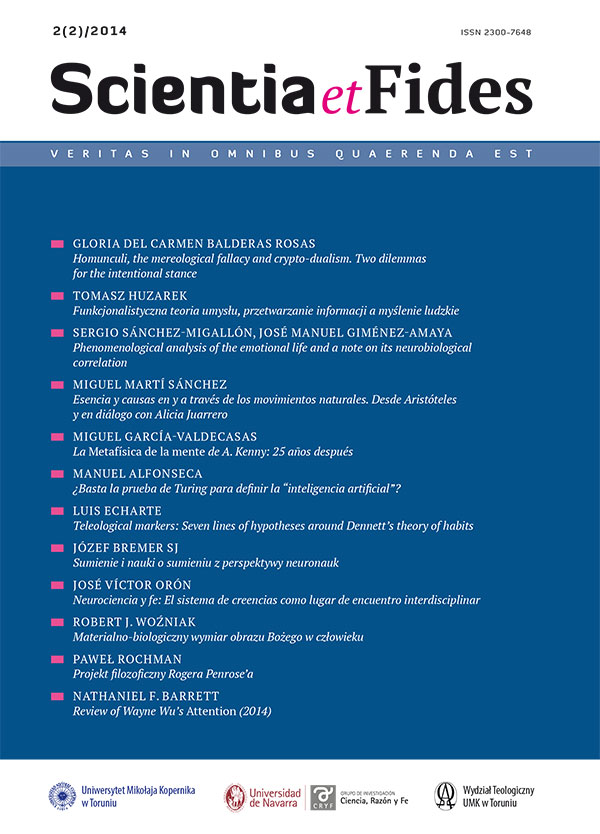Esencia y causas en y a través de los movimientos naturales. Desde Aristóteles y en diálogo con Alicia Juarrero
DOI:
https://doi.org/10.12775/SetF.2014.016Słowa kluczowe
essence, causes, form, complex dynamical systems, natural sciences, ontology, living beingsAbstrakt
Essence and causes in and through the movements in Nature. From Aristotle and in dialogue with Alicia Juarrero
According to Aristotle there is an intrinsic relation between ordinary language, logic and ontology, which is a key element for the knowledge of reality. Such a relation is applied by the Stagirite in the sphere of nature as support for the analysis made by the incipient natural sciences of his time. Thus, Aristotle provided a unitary conception of nature and the sciences which study it. His contributions are still relevant for the study of nature. This paper tries to show the present validity of the Aristotelian thought, provided it is understood in the appropriate way. This attempt is made by means of confronting Aristotle’s ideas with those of a contemporary proposal, namely Juarrero’s, which has nevertheless a similar intention.
Bibliografia
Arana, Juan. 2002. Universo. Materia. Vida. Madrid: Tecnos.
Aristóteles. 1993. Física I-II. Translated by Marcelo D. Boeri. Buenos Aires: Biblos.
Aristóteles. 1994. Reproducción de los animales. Translated by Ester Sánchez. Madrid: Gredos.
Aristóteles. 2010. Acerca del alma. Translated by Marcelo D. Boeri. Buenos Aires: Biblos.
Aristóteles. 2012. Metafísica. Translated by Valentín García Yebra. Madrid: Gredos.
Arpe, Curt. 1938. Das τί ἦν εἶναι bei Aristoteles. Hamburg: De Gruyter & Co.
Berti, Enrico. 2010. Struttura e significato della Metafisica de Aristotele. Roma: EPUSC.
Boeri, Marcelo D. 2006. “Aristóteles contra Parménides: el problema del cambio y la posibilidad de la ciencia física.” Tópicos. Revista de Filosofía 31:45-68.
Frege, Gottlob. 1892. „Über Sinn und Bedeutung.“ Zeitschrift für Philosophie und philosophische Kritik, NF 100: 25-50.
García Yebra, Valentín. 2012. Introducción a Metafísica de Aristóteles: edición trilingüe. Madrid: Gredos.
Gilson, Étienne. 2009. From Aristotle to Darwin and back again: A journey in final causality, species and evolution. San Francisco: Ignatius Press.
Gill, Marie L. 1989. Aristotle on Substance. The paradox of unity. New Jersey: Princeton University Press.
Hegel, Georg W. F. 1985. Lecciones sobre la historia de la filosofía. Translated by Wenceslao Roces. México: Fondo de Cultura Económica.
Inciarte, Fernando. 1974. El reto del positivismo lógico. Madrid: Rialp.
Juarrero, Alicia. 2002a. Dynamics in action: intentional behavior as a complex system. Massachusetts: MIT Press.
Juarrero, Alicia. 2002b. “Complex Dynamical Systems and the Problem of Identity.” Emergence 4 (1/2): 94-104.
Kahn, Charles H. 2003. The Verb ‘Be’ in Ancient Greek. Dordrecht: Hackett Publishing Company, Inc.
Kahn, Charles H. 2009. “The Greek verb ‘to be’ and the concept of being.” In Essays on Being, edited by Charles H. Kahn, 17-40. Oxford: Oxford University Press.
Kapp, Ernst. 1967. Greek Foundations of Traditional Logic. New York: Columbia University Press.
Katayama, Errol G. 1999. Aristotle on artifacts: a metaphysical puzzle. Albany: State University of New York Press.
Murillo, José I. 2005. “El nacimiento de la antropología en Grecia: Polo y la concepción de Platón sobre el hombre.” Studia Poliana 7:7-23.
Owen, G.E.L. 1960. “Logic and Metaphysics in Some Earlier Works of Aristotle,” In Plato and Aristotle in the Mid-Fourth Century, edited by I. During, and G.E.L. Owen, 163-190, Göteborg: Almquist and Wiksell.
Polo, Leonardo. 2008. Introducción a la filosofía. Pamplona: Eunsa.
Rossi, Gabriela. 2011. El azar según Aristóteles. Estructuras de la causalidad accidental en los procesos naturales y en la acción. Bonn: Akademia Verlag.
Schrödinger, Erwin. 1954. Nature and the Greeks. Cambridge: Cambridge University Press.
Spaemann, Robert, and Reinhard Löw. 2005. Natürliche Ziele. Geschichte und Wiederentdeckung des teleologischen Denkens. München: Klett-Cotta.
Vigo, Alejandro G. 2006. Aristóteles. Una introducción. Santiago de Chile: IES.
Vigo, Alejandro G. 2010. “Explicación causal y holismo de trasfondo en la filosofía natural de Aristóteles.” Kriterion 122: 587-615.
Vigo, Alejandro G. 2011a. Estudios aristotélicos. Pamplona: Eunsa.
Vigo, Alejandro G. 2011b. “Naturalismo transcendental.” In Aristotle: Metaphysics and practical philosophy: Essays in honour of Enrico Berti, edited by Enrico Berti, and Carlo Natali, 111-142. Louvain-la-Neuve: Peeters.
Wieland, Wolfgang. 1961. "Das Problem der Prinzipienforschung und die aristotelische Physik." Kant Studien 52, 1-4: 206-219.
Wieland, Wolfgang. 1970. Die aristotelische Physik: Untersuchungen über die Grundlegung der Naturwissenschaft und die sprachlichen Bedingungen der Prinzipienforschung bei Aristoteles. Göttingen: Vandenhoeck & Ruprecht.
Pobrania
Opublikowane
Jak cytować
Numer
Dział
Licencja
Prawa autorskie (c) 2014 Scientia et Fides

Utwór dostępny jest na licencji Creative Commons Uznanie autorstwa – Bez utworów zależnych 4.0 Międzynarodowe.
CC BY ND 4.0. Posiadaczem prawa autorskiego (Licencjodawcą) jest Autor, który na mocy umowy licencyjnej udziela nieodpłatnie prawa do eksploatacji dzieła na polach wskazanych w umowie.
- Licencjodawca udziela Licencjobiorcy licencji niewyłącznej na korzystanie z Utworu/przedmiotu prawa pokrewnego w następujących polach eksploatacji: a) utrwalanie Utworu/przedmiotu prawa pokrewnego; b) reprodukowanie (zwielokrotnienie) Utworu/przedmiotu prawa pokrewnego drukiem i techniką cyfrową (e-book, audiobook); c) wprowadzania do obrotu egzemplarzy zwielokrotnionego Utworu/przedmiotu prawa pokrewnego; d) wprowadzenie Utworu/przedmiotu prawa pokrewnego do pamięci komputera; e) rozpowszechnianie utworu w wersji elektronicznej w formule open access na licencji Creative Commons (CC BY-ND 3.0) poprzez platformę cyfrową Wydawnictwa Naukowego UMK oraz repozytorium UMK.
- Korzystanie przez Licencjobiorcę z utrwalonego Utworu ww. polach nie jest ograniczone czasowo ilościowo i terytorialnie.
- Licencjodawca udziela Licencjobiorcy licencji do Utworu/przedmiotu prawa pokrewnego nieodpłatnie na czas nieokreślony
PEŁEN TEKST UMOWY LICENCYJNEJ >>
Statystyki
Liczba wyświetleń i pobrań: 705
Liczba cytowań: 0



